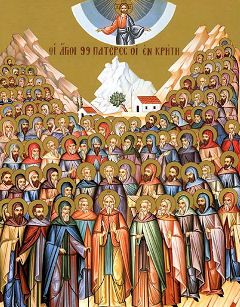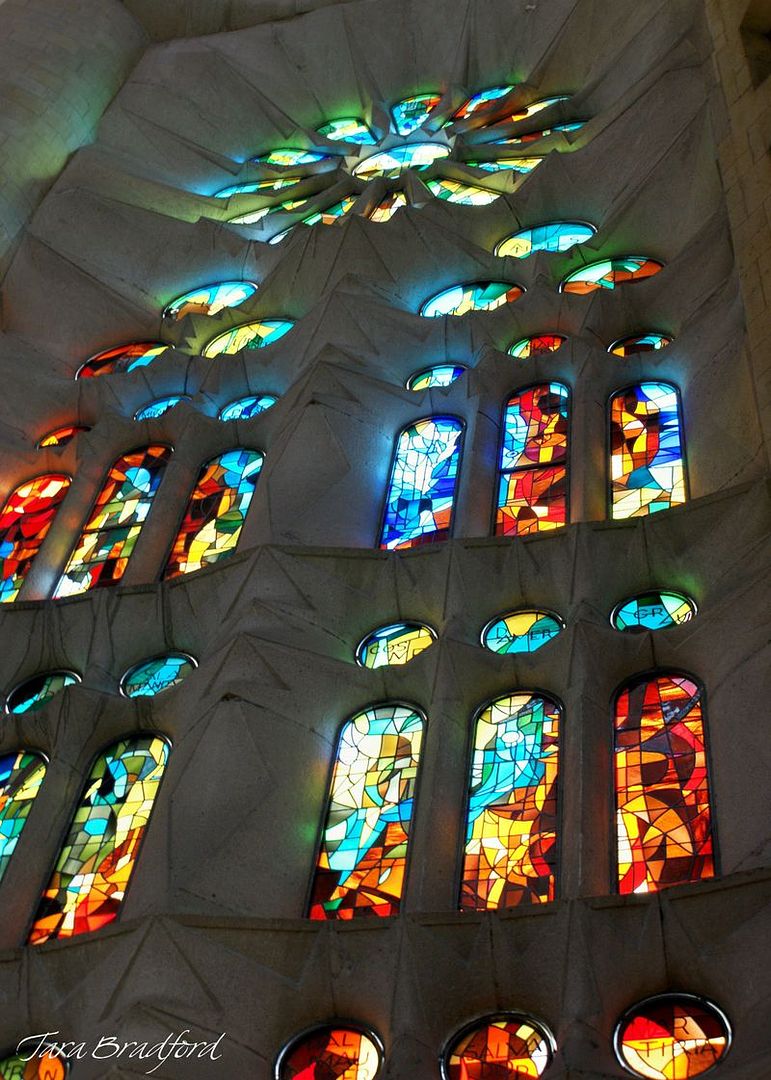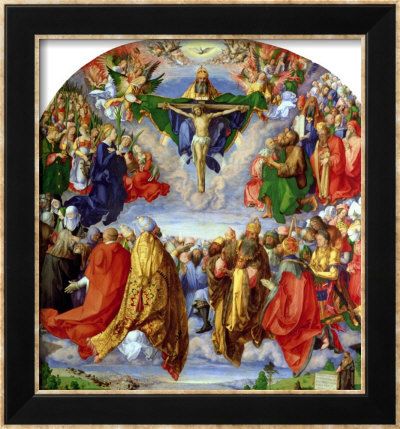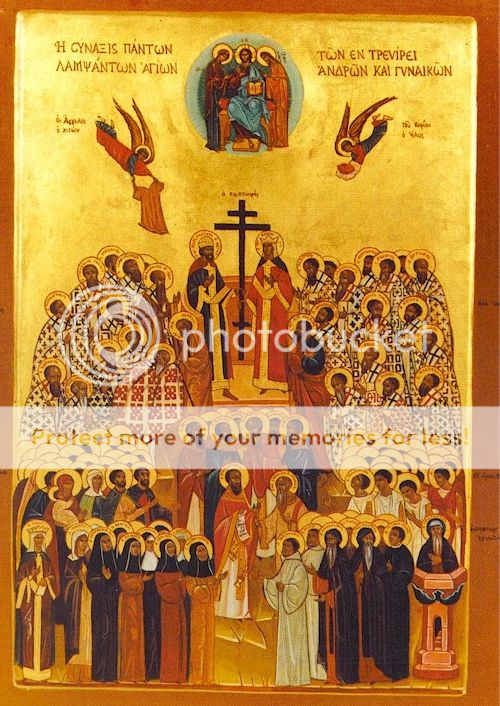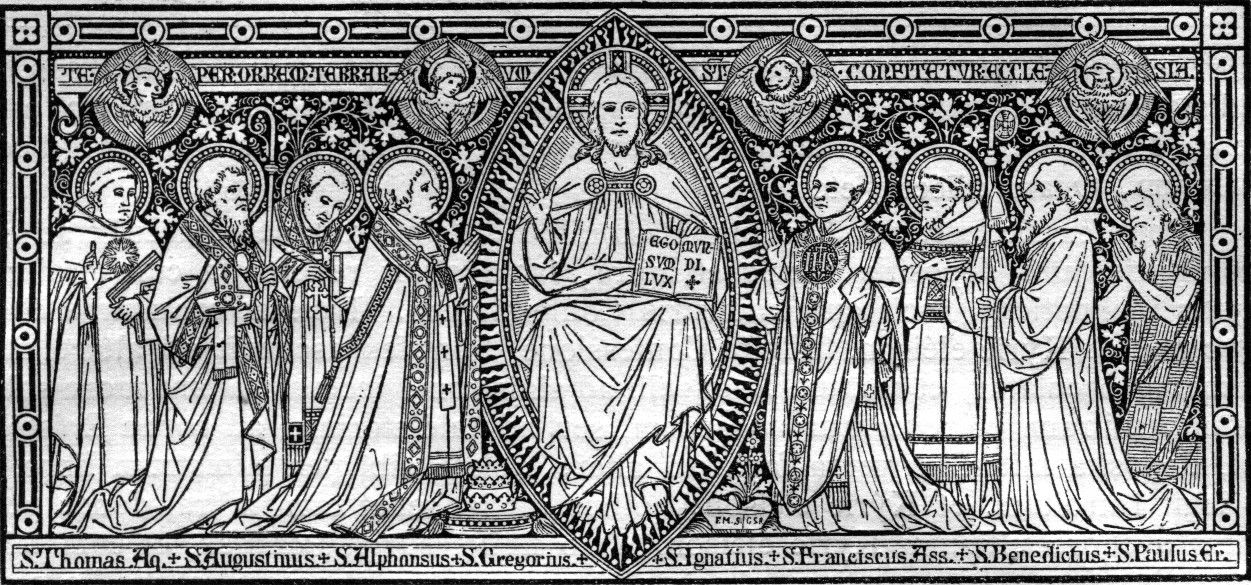Why pray the Rosary every day for a year?
Each time the Blessed Virgin has appeared-- whether it be to Saint Bernadette Soubirous at Lourdes; to Lucia, Jacinta, and Francisco at Fatima; or to Mariette Beco at Banneux-- she has asserted the importance, saving grace, and power of praying the Holy Rosary on a daily basis. Based upon her words, the Rosary is penance and conversion for sinners, a pathway to peace, an end to war, and a powerful act of faith in Jesus Christ. Pope Paul VI presented the Rosary as a powerful means to reach Christ "not merely with Mary but indeed, insofar as this is possible to us, in the same way as Mary, who is certainly the one who thought about Him more than anyone else has ever done."
To show us how this is done, perhaps no one has been more eloquent than the great Cardinal Newman, who wrote: "The great power of the Rosary consists in the fact that it translates the Creed into Prayer. Of course, the Creed is already in a certain sense a prayer and a great act of homage towards God, but the Rosary brings us to meditate again on the great truth of His life and death, and brings this truth close to our hearts. Even Christians, although they know God, usually fear rather than love Him. The strength of the Rosary lies in the particular manner in which it considers these mysteries, since all our thinking about Christ is intertwined with the thought of His Mother, in the relations between Mother and Son; the Holy Family is presented to us, the home in which God lived His infinite love."
As Mary said at Fatima, "Jesus wants to use you to make Me known and loved. He wishes to establish the devotion to My Immaculate Heart throughout the world. I promise salvation to whoever embraces it; these souls will be dear to God, like flowers put by Me to adorn his throne."

Today, June 24, we celebrate the Solemnity of the Nativity of Saint John the Baptist. For the Church, this is a special day—one of the only feast days of a saint falling on the date of birth, rather than the date on which the saint died (Of course, we also celebrate the beheading of Saint John the Baptist in August). Ordinarily the Church observes the day of a saint's death as his feast, because that day marks his entrance into heaven. To this rule there are two notable exceptions, the birthdays of Blessed Mary (celebrated on September 8) and of Saint John the Baptist. All other persons were stained with original sin at birth, preventing a liturgical celebration of the event. But through the grace of God—in preparation for her special role as Mother of God-- Mary, from the first moment of her existence, was free from original sin. Similarly, John was cleansed of original sin in the womb of his mother, jumping for joy at the greeting of Mary to Elizabeth during her visitation (the second Luminous Mystery of the Holy Rosary).
So, today, the Nativity of Saint John the Baptist, is a special day for the Church. For me, this is also a special day, as Saint John is the saint I chose for my confirmation saint—due to his humility, his foresight, his contemplative nature, his tendencies toward penance, self-deprivation, and mortification, and his understanding of his place in the world (that his role was trivial in comparison to that of Christ). Saint Augustine explained the reason for today's observance—an event which heralds the coming of Jesus in anticipation of Christmas-- in the following words:
"Apart from the most holy solemnity commemorating our Savior's birth, the Church keeps the birthday of no other person except that of John the Baptist. (The feasts of the Immaculate Conception and of the Nativity of the Blessed Virgin had not yet been introduced when he wrote this.) In the case of other saints or of God's chosen ones, the Church, as you know, solemnizes the day on which they were reborn to everlasting beatitude after ending the trials of this life and gloriously triumphing over the world.
"For all these the final day of their lives, the day on which they completed their earthly service is honored. But for John the day of his birth, the day on which he began this mortal life is likewise sacred. The reason for this is, of course, that the Lord willed to announce to men His own coming through the Baptist, lest if He appeared suddenly, they would fail to recognize Him. John represented the Old Covenant and the Law. Therefore he preceded the Redeemer, even as the Law preceded and heralded the new dispensation of grace." (For more from Saint Augustine on the Nativity of Saint John the Baptist, click here.)
Saint John the Baptist is, therefore, the Precursor of Christ, the forerunner of the Son of Justice, the minister of baptism of Jesus. His birth prepared the way for the coming of Our Lord and Savior, for the coming of salvation for all.
57When it was time for Elizabeth to have her baby, she gave birth to a son. 58Her neighbors and relatives heard that the Lord had shown her great mercy, and they shared her joy.
59On the eighth day they came to circumcise the child, and they were going to name him after his father Zechariah, 60but his mother spoke up and said, "No! He is to be called John."
61They said to her, "There is no one among your relatives who has that name."
62Then they made signs to his father, to find out what he would like to name the child. 63He asked for a writing tablet, and to everyone's astonishment he wrote, "His name is John." 64Immediately his mouth was opened and his tongue was loosed, and he began to speak, praising God. 65The neighbors were all filled with awe, and throughout the hill country of Judea people were talking about all these things. 66Everyone who heard this wondered about it, asking, "What then is this child going to be?" For the Lord's hand was with him.
80And the child grew and became strong in spirit; and he lived in the desert until he appeared publicly to Israel. (Luke 1: 57-66, 80)
John was born to Elizabeth, the “cousin” of Mary, and Zechariah, an elderly man and priest at the Temple of Jerusalem. Elizabeth, also in advanced age, was childless and sterile, although both she and Zechariah very much wished to conceive. According to the Gospel of Luke, John’s birth was foretold by the angel Gabriel to Zechariah while he was at work in the Temple. However, he did not belief, and was struck mute until he named his son John. John, the cousin of Jesus, the infant who leapt in the presence of the Lord prior even to his birth in purity, grew and began his public ministry—one which prepared the way for Christ. In this way, his birth and life anticipated that of Jesus. Both births were foretold by message of an angel—one to a virgin, one to a woman unable to conceive. Both men brought all to faith—one through baptism by water, one by the Spirit.
John left his father’s home—giving up considerable honor and privilege (and even some riches, perhaps!)-- and went into the desert when he was just an adolescent (scholars estimate between 12 and 15 years old). There, in the desert near the river Jordan, he entered into a contemplative life of hermitude, communing with the Lord in silence. He began a life of mortification and penance, wearing a camel-hair shirt, and sustaining his body with locusts and honey. Soon, he gained notoriety as a pious and holy man, and people flocked to him for baptism in the river. He preached reformation of life.
John served the Lord until the age of 29, at which time the angel of the Lord appeared to him, instructing him to proclaim the coming of Christ, preach penance, and to continue baptizing the many. The angel also informed John that Jesus was the Savior of the World, whom John should baptize (the Second Luminous Mystery of the Holy Rosary), and upon whom the Holy Spirit would descend in the form of a dove.
Jesus called John the greatest of all those who had preceded him, saying: “I tell you, among those born of women, no one is greater than John....” But John would have agreed completely with what Jesus added: “Yet the least in the kingdom of God is greater than he.” (Luke 7:28). Saint John lived the words “He must increase; I must decrease,” (John 3:30) believing them to the core of his being. His purpose was to prepare the way for Jesus. The baptisms John performed were baptisms of repentance and reformation. But the baptisms that Jesus would bring to the world would be through the Holy Spirit and fire. John recognized his role, his insignificance in comparison to the greatness of Christ, and proclaimed himself unworthy to even carry the sandals of Jesus. He said:
31"The one who comes from above is above all; the one who is from the earth belongs to the earth, and speaks as one from the earth. The one who comes from heaven is above all. 32He testifies to what he has seen and heard, but no one accepts his testimony. 33The man who has accepted it has certified that God is truthful. 34For the one whom God has sent speaks the words of God, for God gives the Spirit without limit. 35The Father loves the Son and has placed everything in his hands. 36Whoever believes in the Son has eternal life, but whoever rejects the Son will not see life, for God's wrath remains on him." (John 3: 31-36)
Today is a special day for the Chuch, for all the faithful! In the words of Blessed Guerric of Igny (c.1080-1157), Cistercian abbot, from his sermon on the Nativity of Saint John the Baptist:
"Rightly, then, did the birth of this child make many rejoice then and does make many rejoice today: born in the old age of his parents he was to preach the grace of rebirth to an aging world. Rightly does the Church solemnly venerate this birth, which is wonderfully brought about by grace and at which nature wonders. To me certainly the birth of the world's Lamp (John 5:35) brings fresh joy, for it enabled me to recognize the true Light shining in the darkness but not mastered by the darkness, (Jn1,5.9).
His birth brings me a joy utterly unspeakable, for so many outstanding benefits accrue to the world through it. He is the first to give the Church instruction, to initiate it by penance, to prepare it by baptism. When it is prepared he delivers it to Christ and unites it with him, (John 3:29). He both trains it to live temperately and, by his own death, gives it the strength to die with fortitude. In all these ways he prepares for the Lord a perfect people, (Luke 1:17).”
All powerful God,
help Your people to walk the path to salvation.
By following the teaching of St. John the Baptist,
may we come to your Son, our Lord Jesus Christ,
who lives and reigns with You and the Holy Spirit,
one God, for ever and ever.
Amen.
Theologically, we realize that some individuals, at the moments of their death, are immediately granted the rewards of Heaven. These are the saints we recognize and pray to for intercession. However, we also realize that for some of the faithful departed, ho died in the faith of friendship of the Lord, their souls (upon departing from the body) are not perfectly cleansed from venial sins, or have not fully atoned for past transgressions. These souls cannot not yet attain the Beatific Vision—the reality and goodness of God and Heaven, and must be purified from the temporal effects of their sins. The Church refers to his purification of the elect as “Purgatory,” and recognizes that the faithful on earth can help the elect trhough prayers, alms, deeds and especially by the sacrifice of the Mass.
While no official dogma exists regarding the duration or extent of purification in Purgatory, saints and writers (among them, Saint Augustine), have referred to Purgatory through the metaphor of fire. Pope Benedict XVI has stated that Purgatory may be an “existential state” as opposed to a temporal plane, and may be experienced outside the confines of space and time as we understand it. We look to Purgatory as a time of preparation, as we are scrubbed clean before entering the pure presence of the Almighty God.
The Church's teaching about Purgatory, the place of purification, is explained in the Catechism of the Catholic Church:
"All who die in god's grace and friendship, but still imperfectly purified, are indeed assured of their eternal salvation; but after death they undergo purification so as to achieve the holiness necessary to enter heaven.
The Church gives the name Purgatory to this final purification of the elect, which is entirely different from the punishment of the damned. The Church formulated her doctrine of faith on Purgatory especially at the Councils of Florence and Trent. The tradition of the Church, by reference to certain texts of Scripture, speaks of a cleansing fire:
As for certain lesser faults, we must believe that, before the Final Judgment, there is a purifying fire. He who is truth says that whoever utters blasphemy against the Holy spirit will be pardoned neither in this age nor in the age to come. From this sentence we understand that certain offenses can be forgiven in this age, but certain others in the age to come.
This teaching is also based on the practice of prayer for the dead, already mentioned in Sacred Scripture: 'Therefore [Judas Maccabeus' made atonement for the dead, that they might be delivered from their sin.' From the beginning the Church has honored the memory of the dead and offered prayers in suffrage for them, above all the Eucharistic sacrifice, so that, thus purified, they may attain the beatific vision of God. The Church also commends almsgiving, indulgences, and works of penance undertaken on behalf of the dead.”
We pause today, on this, the Feast of All Souls, to remember those who went before us marked by the sign of faith. Together, in the communion of the saints, Our Lord, and Our Blessed Mother, we pray for their purification and eternal joy in the light of Heaven!
Merciful Father,
hear our prayer and console us.
As we renew our faith in Your Son,
whom You raised from the dead,
strengthen our hope that all our departed brothers and sisters
will share in His resurrection,
who lives and reigns with You and the Holy Spirit,
one God, for ever and ever. Amen
Year 2: Day 306 of 365
Prayer Intentions: The purification of the souls of Purgatory.
Requested Intentions: Restoration of a marriage (A); Peace and tolerance in a family, support for those with Parkinson’s Disease (M); For the restoration of a daughter’s marriage, end to debt (S); Employment and continued strength (K); Successful examinations for a son (J); Employment and blessings of a child (S); Employment and financial security (F); Successful work placement, continued health (A); Grace and healing for a family (P); Healing of a father (M); Academic success for son, employment for husband and brother (B); Freedom from anxiety and panic attacks (R); Health and healing in preparation for surgery (C); Healing of a chronic illness (P); Safety of a family during storms (A); Successful home ownership (P); Healing of a marriage (M); Employment for a husband, blessings for a marriage (E); Successful examinations for a daughter, healing of a relationships (V); Blessing for a family (V); Healing of baby girl M and all children suffering (M); Special intentions (R); Business success, peace, health (E); Conversion and deliverance of those who suffer, increase in vocations (M); Financial security and safe housing (M); For a daughter (K).
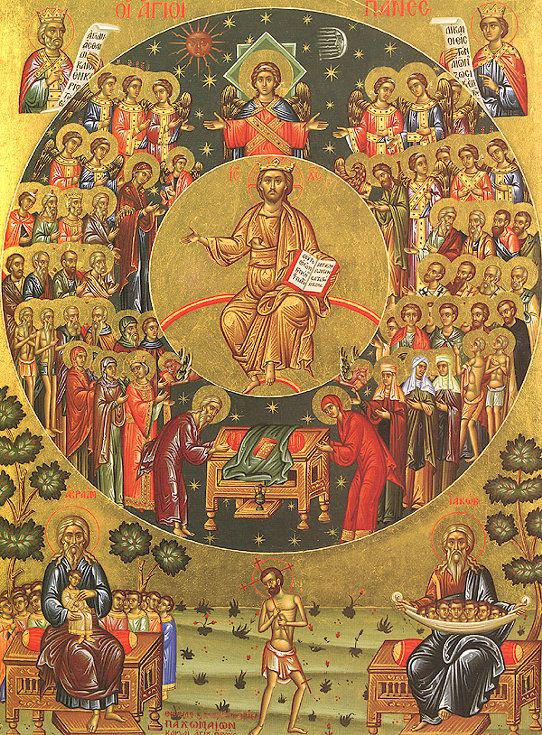
Each day of the liturgical year, the Church celebrates the lives of one or more saints—men and women recognized for their holiness and contribution to the faith. Today, November 1, we celebrate the Solemnity of All Saints—the day on which the Church celebrates all the saints—those whose names we know, and those purified in heaven. In celebration and honor, we pray:
Lord, have mercy on us. Christ, have mercy on us. Lord, have mercy on us.
Christ, hear us. Christ, graciously hear us.
God the Father of Heaven, have mercy on us.
God the Son, Redeemer of the world, have mercy on us.
God the Holy Spirit, have mercy on us.
Holy Trinity, One God, have mercy on us.
Holy Mary, Holy Mother of God, pray for us
Holy Virgin of virgins, pray for us
St. Michael, St. Gabriel, St. Raphael, pray for us
All you holy Angels and Archangels, pray for us
All you holy orders of blessed Spirits, pray for us
St. John the Baptist, pray for us
St. Joseph, pray for us
All you holy Patriarchs and Prophets, pray for us
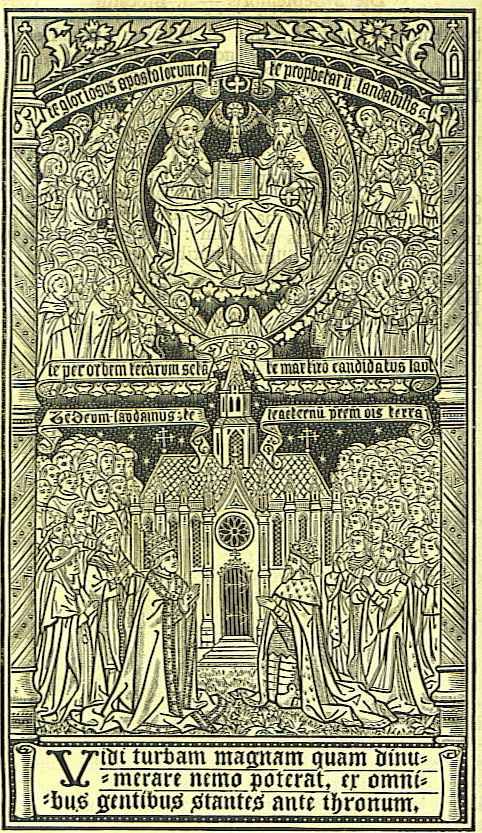 St. Peter, St. Paul, St. Andrew, St. James, pray for us
St. Peter, St. Paul, St. Andrew, St. James, pray for us
St. John, St. Thomas, St. James, St. Philip, pray for us
St. Bartholomew, St. Matthew, St. Simon, St. Thaddeus, pray for us
St. Matthias, St. Barnabas, St. Luke, St. Mark, pray for us
All you holy Apostles and Evangelists, pray for us
All you holy Disciples of the Lord, pray for us
All you holy Innocents, pray for us
St. Stephen, St. Lawrence, pray for us
St. Vincent, Sts. Fabian and Sebastian, pray for us
Sts. John and Paul, pray for us
Sts. Cosmas and Damian, pray for us
Sts. Gervase and Protase, pray for us
All you holy Martyrs, pray for us
St. Sylvester, St. Gregory, pray for us
St. Ambrose, pray for us
St. Augustine, pray for us
St. Jerome, pray for us
St. Martin, St. Nicholas, pray for us
All you holy Bishops and Confessors, pray for us
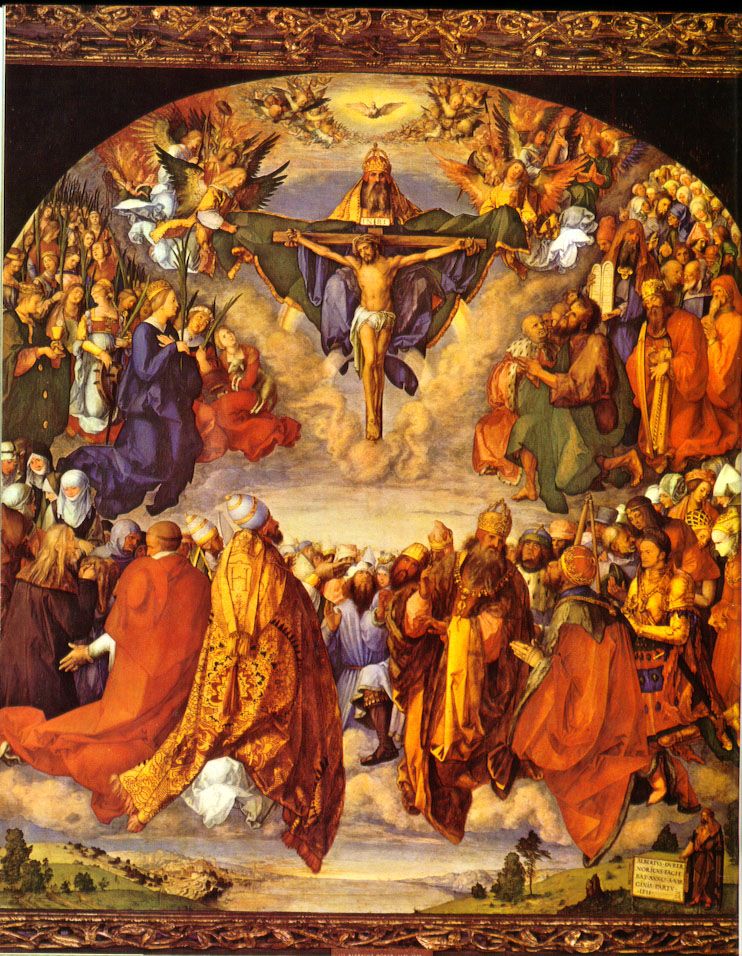
All you holy Doctors, pray for us
St. Anthony, St. Benedict, pray for us
St. Bernard, St. Dominic, pray for us
St. Francis, pray for us
All you holy Priests and Levites, pray for us
All you holy Monks and Hermits, pray for us
St. Mary Magdalen, pray for us
St. Agatha, St. Lucy, pray for us
St. Agnes, St. Cecilia, pray for us
St. Catherine, St. Anastasia, pray for us
All you holy Virgins and Widows, pray for us
All you Holy Men and Women, pray for us
Saints of God, make intercession for us.
Be merciful, spare us, O Lord.
Be merciful, graciously hear us, O Lord.
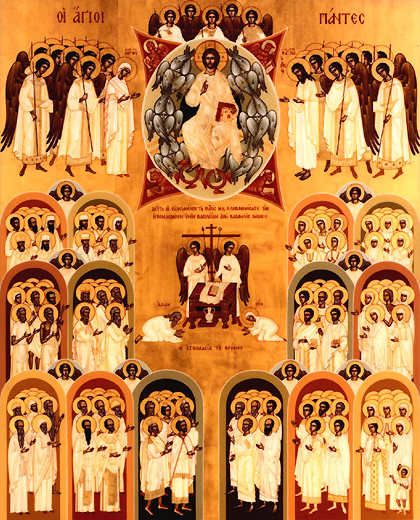 From all evil, O Lord, deliver us
From all evil, O Lord, deliver us
From all sin, O Lord, deliver us
From your wrath, O Lord, deliver us
From sudden and unprovided death, O Lord, deliver us
From the snares of the devil, O Lord, deliver us
From anger, and hatred, and all ill-will, O Lord, deliver us
From the spirit of fornication, O Lord, deliver us
From lightning and tempest, O Lord, deliver us
From the scourge of earthquake, O Lord, deliver us
From plague, famine, and war, O Lord, deliver us
From everlasting death, O Lord, deliver us
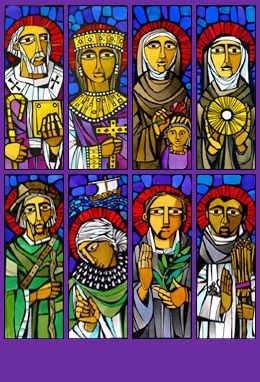
Through the mystery of your holy Incarnation, O Lord, deliver us
Through your Coming, O Lord, deliver us
Through your Nativity, O Lord, deliver us
Through your Baptism and holy Fasting, O Lord, deliver us
Through your Cross and Passion, O Lord, deliver us
Through your Death and Burial, O Lord, deliver us
Through your holy Resurrection, O Lord, deliver us
Through your admirable Ascension, O Lord, deliver us
Through the coming of the Holy Spirit, the Paraclete, O Lord, deliver us
In the day of judgment, O Lord, deliver us
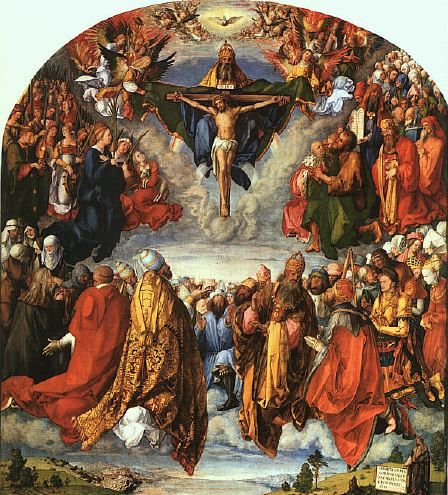
We sinners, We beseech you, hear us
That you would spare us, We beseech you, hear us
That you would pardon us, We beseech you, hear us
That you would bring us to true penance, We beseech you, hear us
That you would deign to govern and preserve your holy Church, We beseech you, hear us
That you would deign to preserve our Apostolic Prelate, and all orders of the Church in holy religion, We beseech you, hear us
That you would deign to humble the enemies of Holy Church, We beseech you, hear us
That you would deign to give peace and true concord to Christian kings and princes, We beseech you, hear us
That you would deign to grant peace and unity to all Christian people, We beseech you, hear us
That you would deign to call back to the unity of the Church all who have strayed from the truth and lead all unbelievers to the light of the Gospel, We beseech you, hear us
That you would deign to confirm and preserve us in your holy service, We beseech you, hear us

That you would lift up our minds to heavenly desires, We beseech you, hear us
That you would render eternal blessings to all our benefactors, We beseech you, hear us
That you would deliver our souls and the souls of our brethren, relations and benefactors, from eternal damnation, We beseech you, hear us
That you would deign to give and preserve the fruits of the earth, We beseech you, hear us
That you would deign to grant eternal rest to all the faithful departed, We beseech you, hear us
That you would deign graciously hear us, Son of God, We beseech you, hear us
Lamb of God, Who takes away the sins of the world, spare us, O Lord.
Lamb of God, Who takes away the sins of the world, graciously hear us, O Lord.
Lamb of God, Who takes away the sins of the world, have mercy on us.
Christ, hear us. Christ, graciously hear us.
Lord, have mercy. Christ, have mercy. Lord, have mercy.
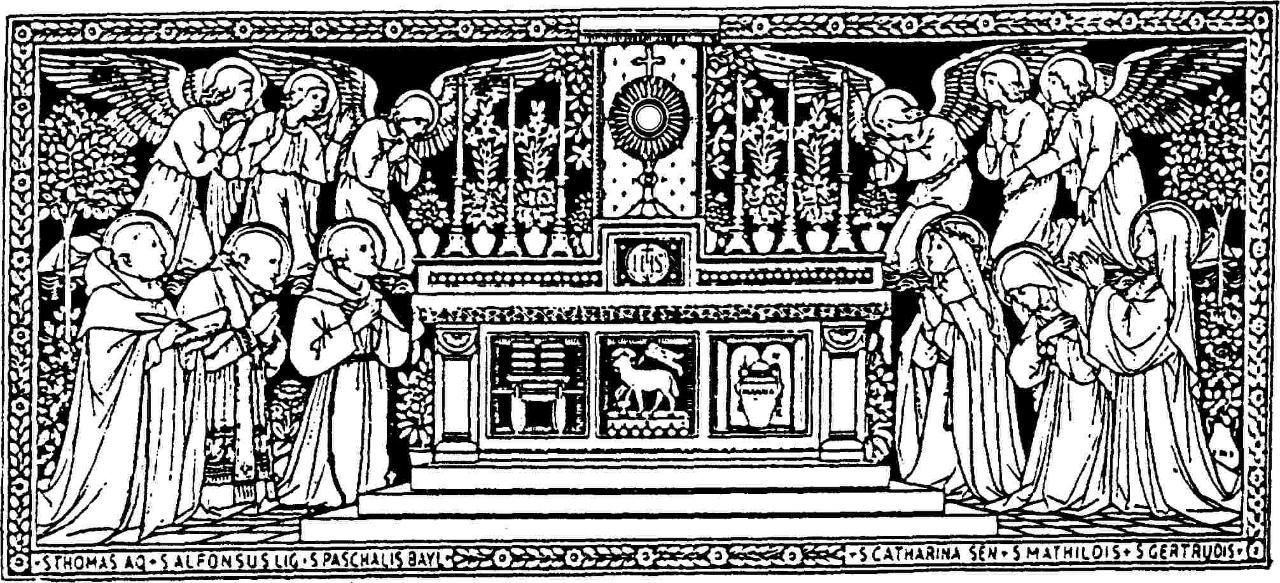 O God, whose property is always to have mercy and to spare, receive our petition, that we, and all your servants who are bound by the chains of sin, may, by the compassion of your goodness, be mercifully absolved. Graciously hear, we beg you, O Lord, the prayers of your suppliants, and pardon the sins of those who confess to you, that in your bounty you may grant us both pardon and peace.
O God, whose property is always to have mercy and to spare, receive our petition, that we, and all your servants who are bound by the chains of sin, may, by the compassion of your goodness, be mercifully absolved. Graciously hear, we beg you, O Lord, the prayers of your suppliants, and pardon the sins of those who confess to you, that in your bounty you may grant us both pardon and peace.
In your clemency, O Lord, show us your ineffable mercy, that you may both free us from all our sins, and deliver us from the punishments which we deserve for them.
God, who by sin are offended and by penance pacified, mercifully regard the prayers of your suppliant people, and turn away the scourges of your anger, which we deserve for our sins.
Almighty, everlasting God, have mercy upon your servant N., our Sovereign Pontiff, and direct him according to your clemency into the way of everlasting salvation, that by your grace he may desire those things that are pleasing to you, and perform them with all his strength.
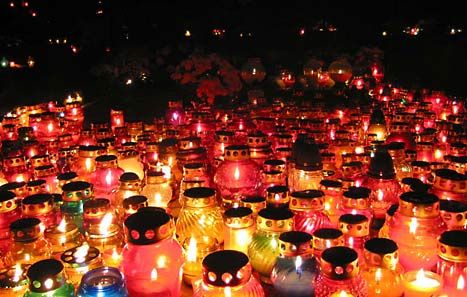
O God, from whom are holy desires, good counsels, and just works, give to your servants that peace which the world cannot give, that our hearts be set to keep your commandments, and that, being removed from the fear of our enemies, we may pass our time in peace under your protection.
Burn our desires and our hearts with the fire of the Holy Spirit, O Lord, that we may serve you with a chaste body, and with a clean heart be pleasing to you.
O God, the Creator and Redeemer of all the faithful, grant to the souls of your servants and handmaids the remission of all their sins, that, through devout prayers, they may obtain the pardon which they always desired.
Direct, we beg you, O Lord, our actions by your holy inspirations, and carry them on by your gracious assistance, that every prayer and work of ours may begin always with you, and through you be happily ended.
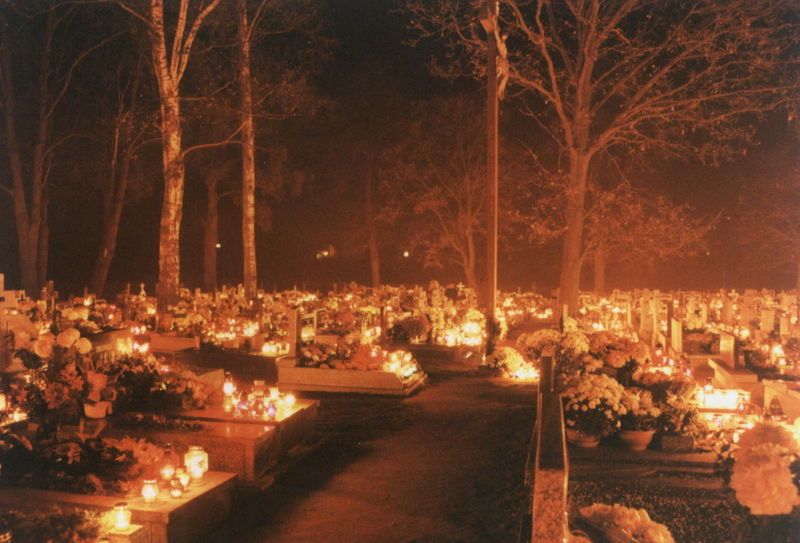
Almighty and everlasting God, you have dominion over the living and the dead, and you are merciful to all who you foreknow will be yours by faith and good works; we humbly beg you that those for whom we intend to pour forth our prayers, whether this present world still detain them in the flesh, or the world to come has already received them our of their bodies, may through the intercession of all your Saints, by the clemency of your goodness, obtain the remission of all their sins. Through Christ our Lord. Amen.
O Lord, hear my prayer. And let my cry come to you.
May the almighty and merciful Lord graciously hear us. Amen.
And may the souls of the faithful departed, through the mercy of God, rest in peace. Amen.
Prayer Source: Enchiridion of Indulgences , June 29, 1968
"Why should our praise and glorification, or even the celebration of this feast day mean anything to the saints? What do they care about earthly honors when their heavenly Father honors them by fulfilling the faithful promise of the Son? What does our commendation mean to them? The saints have no need of honor from us; neither does our devotion add the slightest thing to what is theirs. Clearly, if we venerate their memory, it serves us, not them. But I tell you, when I think of them, I feel myself inflamed by a tremendous yearning.
Calling the saints to mind inspires, or rather arouses in us, above all else, a longing to enjoy their company, so desirable in itself. We long to share in the citizenship of heaven, to dwell with the spirits of the blessed, to join the assembly of patriarchs, the ranks of the prophets, the council of apostles, the great host of martyrs, the noble company of confessors and the choir of virgins. In short, we long to be united in happiness with all the saints. But our dispositions change. The Church of all the first followers of Christ awaits us, but we do nothing about it. The saints want us to be with them, and we are indifferent. The souls of the just await us, and we ignore them.
Come, brothers, let us at length spur ourselves on. We must rise again with Christ, we must seek the world which is above and set our mind on the things of heaven. Let us long for those who are longing for us, hasten to those who are waiting for us, and ask those who look for our coming to intercede for us. We should not only want to be with the saints, we should also hope to possess their happiness. While we desire to be in their company, we must also earnestly seek to share in their glory. Do not imagine that there is anything harmful in such an ambition as this; there is no danger in setting our hearts on such glory.
When we commemorate the saints we are inflamed with another yearning: that Christ our life may also appear to us as he appeared to them and that we may one day share in his glory. Until then we see him, not as he is, but as he became for our sake. He is our head, crowned, not with glory, but with the thorns of our sins. As members of that head, crowned with thorns, we should be ashamed to live in luxury; his purple robes are a mockery rather than an honor. When Christ comes again, his death shall no longer be proclaimed, and we shall know that we also have died, and that our life is hidden with him. The glorious head of the Church will appear and his glorified members will shine in splendor with him, when he forms this lowly body anew into such glory as belongs to himself, its head.
Therefore, we should aim at attaining this glory with a wholehearted and prudent desire. That we may rightly hope and strive for such blessedness, we must above all seek the prayers of the saints. Thus, what is beyond our own powers to obtain will be granted through their intercession."
Who Thee by faith before the world confessed,
Thy Name, O Jesus, be forever blessed.
Alleluia, Alleluia!
Thou wast their Rock, their Fortress and their Might;
Thou, Lord, their Captain in the well fought fight;
Thou, in the darkness drear, their one true Light.
Alleluia, Alleluia!
For the Apostles’ glorious company,
Who bearing forth the Cross o’er land and sea,
Shook all the mighty world, we sing to Thee:
Alleluia, Alleluia!
For the Evangelists, by whose blest word,
Like fourfold streams, the garden of the Lord,
Is fair and fruitful, be Thy Name adored.
Alleluia, Alleluia!
For Martyrs, who with rapture kindled eye,
Saw the bright crown descending from the sky,
And seeing, grasped it, Thee we glorify.
Alleluia, Alleluia!
O blest communion, fellowship divine!
We feebly struggle, they in glory shine;
All are one in Thee, for all are Thine.
Alleluia, Alleluia!
O may Thy soldiers, faithful, true and bold,
Fight as the saints who nobly fought of old,
And win with them the victor’s crown of gold.
Alleluia, Alleluia!
And when the strife is fierce, the warfare long,
Steals on the ear the distant triumph song,
And hearts are brave, again, and arms are strong.
Alleluia, Alleluia!
The golden evening brightens in the west;
Soon, soon to faithful warriors comes their rest;
Sweet is the calm of paradise the blessed.
Alleluia, Alleluia!
But lo! there breaks a yet more glorious day;
The saints triumphant rise in bright array;
The King of glory passes on His way.
Alleluia, Alleluia!
From earth’s wide bounds, from ocean’s farthest coast,
Through gates of pearl streams in the countless host,
And singing to Father, Son and Holy Ghost:
Alleluia, Alleluia!
(Ralph Vaughn Williams)
Each day of the liturgical year, the Church celebrates the lives of one or more saints—men and women recognized for their holiness and contribution to the faith. Today, November 1, we celebrate the Solemnity of All Saints—the day on which the Church celebrates all the saints—those whose names we know, and those purified in heaven:
“After this I had a vision of a great multitude, which no one could count, from every nation, race, people, and tongue. They stood before the throne and before the Lamb, wearing white robes and holding palm branches in their hands.... [One of the elders] said to me, ‘These are the ones who have survived the time of great distress; they have washed their robes and made them white in the blood of the Lamb.’” (Revelation 7:9,14)
The feast of All Saints inspires us with tremendous hope—hope that we, too, will achieve sainthood in heaven. For, it is certain that among the saints in heaven are those who we have known on earth. Some we have read about. Some we have modeled our lives after or aspired to be like. Some we have personally known, and they have gone before us marked with the sign of faith. We are reminded today, especially as we read the Beatitudes in the Gospel, that there is one true way to achieve happiness on earth and sanctity in heaven: by faithfully following the teachings of Jesus Christ, as the saints and martyrs before us did!
Pope Benedict, on All Saint’s Day (2008) proclaimed the following words:
“With great joy, we celebrate today the feast of All Saints. Visiting a nursery garden, one remains taken aback at the variety of plants and flowers, and spontaneously begins to think of the Creator's fantasy that made the earth a marvelous garden. These same sentiments come to us when we consider the spectacle of holiness: the world appears to us as a "garden," where the Spirit of God has sustained with remarkable wonder a multitude of saints, male and female, from every age and social condition, of every tongue, people and culture.
Each is different from the others, with the uniqueness of their own personality and their own spiritual charism. All, however, were marked by the "seal" of Jesus, the imprint of his love, witnessed upon the Cross. All now are at joy, in a feast without end as, like Jesus, they reached this goal across toil and trial, each one encountering their share of sacrifice to participate in the glory of the resurrection.”
So, today, we celebrate and honor the saints and martyrs of the Church—both known and unknown. While there are thousands of canonized saints in the Church, we known there are an incalculable number whose names have not been recorded—from early Christian martyrs to those in our communities who lived quiet, humble lives in service to the Lord and one another. We ask for their prayers and intercessions, and appreciate our deep communion with them—that is, that all of God's people, on heaven, earth, and in Purgatory in the state of purification, are connected in a communion. The saints of God are just as alive as you and I, and are constantly interceding on our behalf. As with Our Blessed Mother, the saints are not all-knowing or all-powerful. However, because of our common communion with and through Jesus Christ, our prayers are joined with the heavenly community of Christians.
From the Catechism of the Catholic Church: "...as Christian communion among our fellow pilgrims brings us closer to Christ, so our communion with the saints joins us to Christ, from whom as from its fountain and head issues all grace, and the life of the People of God itself: We worship Christ as God's Son; we love the martyrs as the Lord's disciples and imitators, and rightly so because of their matchless devotion towards their king and master. May we also be their companions and fellow disciples.” (CCC 956, 957)
Today, on this most holy of days, we raise our voices with the saints and martyrs—known and unknown—and praise the Lord! May all the holy saints and martyrs of the Church pray for us, on this their solemnity!
"The glorious company of the apostles praise Thee.
The goodly fellowship of the prophets praise Thee.
The white-robed army of martyrs praise Thee.
All Thy saints and elect with one voice do acknowledge Thee,
O Blessed Trinity, one God!"
(Te Deum)
Father, all-powerful and ever-living God,
today we rejoice in the holy men and women
of every time and place.
May their prayers bring us your forgiveness and love.
We ask this through our Lord Jesus Christ, Your Son,
who lives and reigns with You and the Holy Spirit,
one God, for ever and ever. Amen.
Year 2: Day 305 365
Prayer Intentions: Spiritual sainthood on earth.
Requested Intentions: Restoration of a marriage (A); Peace and tolerance in a family, support for those with Parkinson’s Disease (M); For the restoration of a daughter’s marriage, end to debt (S); Employment and continued strength (K); Successful examinations for a son (J); Employment and blessings of a child (S); Employment and financial security (F); Successful work placement, continued health (A); Grace and healing for a family (P); Healing of a father (M); Academic success for son, employment for husband and brother (B); Freedom from anxiety and panic attacks (R); Health and healing in preparation for surgery (C); Healing of a chronic illness (P); Safety of a family during storms (A); Successful home ownership (P); Healing of a marriage (M); Employment for a husband, blessings for a marriage (E); Successful examinations for a daughter, healing of a relationships (V); Blessing for a family (V); Healing of baby girl M and all children suffering (M); Special intentions (R); Business success, peace, health (E); Conversion and deliverance of those who suffer, increase in vocations (M); Financial security and safe housing (M); For a daughter (K).
Today, June 24, we celebrate the Solemnity of the Nativity of Saint John the Baptist. For the Church, this is a special day—one of the only feast days of a saint falling on the date of birth, rather than the date on which the saint died (Of course, we also celebrate the beheading of Saint John the Baptist in August). Ordinarily the Church observes the day of a saint's death as his feast, because that day marks his entrance into heaven. To this rule there are two notable exceptions, the birthdays of Blessed Mary (celebrated on September 8) and of Saint John the Baptist. All other persons were stained with original sin at birth, preventing a liturgical celebration of the event. But through the grace of God—in preparation for her special role as Mother of God-- Mary, from the first moment of her existence, was free from original sin. Similarly, John was cleansed of original sin in the womb of his mother, jumping for joy at the greeting of Mary to Elizabeth during her visitation (the second Luminous Mystery of the Holy Rosary).
So, today, the Nativity of Saint John the Baptist, is a special day for the Church. For me, this is also a special day, as Saint John is the saint I chose for my confirmation saint—due to his humility, his foresight, his contemplative nature, his tendencies toward penance, self-deprivation, and mortification, and his understanding of his place in the world (that his role was trivial in comparison to that of Christ). Saint Augustine explained the reason for today's observance—an event which heralds the coming of Jesus in anticipation of Christmas-- in the following words:
"Apart from the most holy solemnity commemorating our Savior's birth, the Church keeps the birthday of no other person except that of John the Baptist. (The feasts of the Immaculate Conception and of the Nativity of the Blessed Virgin had not yet been introduced when he wrote this.) In the case of other saints or of God's chosen ones, the Church, as you know, solemnizes the day on which they were reborn to everlasting beatitude after ending the trials of this life and gloriously triumphing over the world.
"For all these the final day of their lives, the day on which they completed their earthly service is honored. But for John the day of his birth, the day on which he began this mortal life is likewise sacred. The reason for this is, of course, that the Lord willed to announce to men His own coming through the Baptist, lest if He appeared suddenly, they would fail to recognize Him. John represented the Old Covenant and the Law. Therefore he preceded the Redeemer, even as the Law preceded and heralded the new dispensation of grace." (For more from Saint Augustine on the Nativity of Saint John the Baptist, click here.)
Saint John the Baptist is, therefore, the Precursor of Christ, the forerunner of the Son of Justice, the minister of baptism of Jesus. His birth prepared the way for the coming of Our Lord and Savior, for the coming of salvation for all.
57When it was time for Elizabeth to have her baby, she gave birth to a son. 58Her neighbors and relatives heard that the Lord had shown her great mercy, and they shared her joy.
59On the eighth day they came to circumcise the child, and they were going to name him after his father Zechariah, 60but his mother spoke up and said, "No! He is to be called John."
61They said to her, "There is no one among your relatives who has that name."
62Then they made signs to his father, to find out what he would like to name the child. 63He asked for a writing tablet, and to everyone's astonishment he wrote, "His name is John." 64Immediately his mouth was opened and his tongue was loosed, and he began to speak, praising God. 65The neighbors were all filled with awe, and throughout the hill country of Judea people were talking about all these things. 66Everyone who heard this wondered about it, asking, "What then is this child going to be?" For the Lord's hand was with him.
80And the child grew and became strong in spirit; and he lived in the desert until he appeared publicly to Israel. (Luke 1: 57-66, 80)
John was born to Elizabeth, the “cousin” of Mary, and Zechariah, an elderly man and priest at the Temple of Jerusalem. Elizabeth, also in advanced age, was childless and sterile, although both she and Zechariah very much wished to conceive. According to the Gospel of Luke, John’s birth was foretold by the angel Gabriel to Zechariah while he was at work in the Temple. However, he did not belief, and was struck mute until he named his son John. John, the cousin of Jesus, the infant who leapt in the presence of the Lord prior even to his birth in purity, grew and began his public ministry—one which prepared the way for Christ. In this way, his birth and life anticipated that of Jesus. Both births were foretold by message of an angel—one to a virgin, one to a woman unable to conceive. Both men brought all to faith—one through baptism by water, one by the Spirit.
John left his father’s home—giving up considerable honor and privilege (and even some riches, perhaps!)-- and went into the desert when he was just an adolescent (scholars estimate between 12 and 15 years old). There, in the desert near the river Jordan, he entered into a contemplative life of hermitude, communing with the Lord in silence. He began a life of mortification and penance, wearing a camel-hair shirt, and sustaining his body with locusts and honey. Soon, he gained notoriety as a pious and holy man, and people flocked to him for baptism in the river. He preached reformation of life.
John served the Lord until the age of 29, at which time the angel of the Lord appeared to him, instructing him to proclaim the coming of Christ, preach penance, and to continue baptizing the many. The angel also informed John that Jesus was the Savior of the World, whom John should baptize (the Second Luminous Mystery of the Holy Rosary), and upon whom the Holy Spirit would descend in the form of a dove.
Jesus called John the greatest of all those who had preceded him, saying: “I tell you, among those born of women, no one is greater than John....” But John would have agreed completely with what Jesus added: “Yet the least in the kingdom of God is greater than he.” (Luke 7:28). Saint John lived the words “He must increase; I must decrease,” (John 3:30) believing them to the core of his being. His purpose was to prepare the way for Jesus. The baptisms John performed were baptisms of repentance and reformation. But the baptisms that Jesus would bring to the world would be through the Holy Spirit and fire. John recognized his role, his insignificance in comparison to the greatness of Christ, and proclaimed himself unworthy to even carry the sandals of Jesus. He said:
31"The one who comes from above is above all; the one who is from the earth belongs to the earth, and speaks as one from the earth. The one who comes from heaven is above all. 32He testifies to what he has seen and heard, but no one accepts his testimony. 33The man who has accepted it has certified that God is truthful. 34For the one whom God has sent speaks the words of God, for God gives the Spirit without limit. 35The Father loves the Son and has placed everything in his hands. 36Whoever believes in the Son has eternal life, but whoever rejects the Son will not see life, for God's wrath remains on him." (John 3: 31-36)
Today is a special day for the Chuch, for all the faithful! In the words of Blessed Guerric of Igny (c.1080-1157), Cistercian abbot, from his sermon on the Nativity of Saint John the Baptist:
"Rightly, then, did the birth of this child make many rejoice then and does make many rejoice today: born in the old age of his parents he was to preach the grace of rebirth to an aging world. Rightly does the Church solemnly venerate this birth, which is wonderfully brought about by grace and at which nature wonders. To me certainly the birth of the world's Lamp (John 5:35) brings fresh joy, for it enabled me to recognize the true Light shining in the darkness but not mastered by the darkness, (Jn1,5.9).
His birth brings me a joy utterly unspeakable, for so many outstanding benefits accrue to the world through it. He is the first to give the Church instruction, to initiate it by penance, to prepare it by baptism. When it is prepared he delivers it to Christ and unites it with him, (John 3:29). He both trains it to live temperately and, by his own death, gives it the strength to die with fortitude. In all these ways he prepares for the Lord a perfect people, (Luke 1:17).”
All powerful God,
help Your people to walk the path to salvation.
By following the teaching of St. John the Baptist,
may we come to your Son, our Lord Jesus Christ,
who lives and reigns with You and the Holy Spirit,
one God, for ever and ever.
Amen.
Year 2: Day 175 of 365
Prayer Intentions: Knowledge and conviction of our faith; For those wrongly imprisoned. For all those who are wrongly put to death.
Requested Intentions: For a mother’s mental health and for kindness and forgiveness, for housing problems, for dental health (T); For the soul of a departed friend (X); Restoration of health (D); Successful employment for couple (N); For employment for children (K); For health of friend, for successful relationships for children, for safe pregnancy for daughter (C); For the health of a mother (J); Virtue for daughter (V); Successful acceptance to college for nephew (M); For the health of a cousin (T); Freedom from legal difficulties for husband (S); Husband’s freedom from illness (L); Personal intentions (S); Successful passing of dental board examination (P); Blessings on a family (Z); Successful permanent employment (C); Healing of a son with autism (J)
Today, June 19, we celebrate the Solemnity of the Holy Trinity, or “Trinity Sunday”—a day in which we contemplate and celebrate the most profound mystery of our faith: the Blessed threefold unity of our Lord. God the Father, God the Son, and God the Holy Spirit are one God, albeit in three persons.
We may never fully understand the mystery of the Trinity, for the complexity and magnitude of the triune God defies understanding by the human mind. Saint Augustine of Hippo told the story of his own quest for comprehension of the Trinity, so that he might explain it more logically to others. One day, in his own account, he was walking along the seashore and reflecting on this matter. Suddenly, he saw a little child all alone on the shore. The child made a hole in the sand, ran to the sea with a little cup, filled her cup with sea water, ran up and emptied the cup into the hole she had made in the sand. He watched her do this repeatedly, running to the sea, filling her cup, and pouring it into the small hoe she had dug. Finally, he addressed her: “Little child, what are you doing?”
She replied, “I am trying to empty the sea into this hole.”
“How do you think,” Augustine asked her, “that you can empty this immense sea into this tiny hole and with this tiny cup?”
She answered back, “And you, how do you suppose that with your small head you can comprehend the immensity of God?” With that the child disappeared.
It is not for us to fully understand the immensity of Our Lord, but it is in contemplation of this divine gift that we are drawn closer into the life of Christ, the mission of the Church, and indeed, the underpinnings of our faith. Pope John Paul II, in his series of General Audiences on the Holy Trinity, reminds us that in this contemplation, we are entering into the mystical experience of the saints and becoming one with the Church. As we are created in the image of God, the more we understand the Trinity, the more we come to understand ourselves.
Dear Brothers and Sisters,
1. "O superessential Trinity, infinitely divine and good, guardian of the divine wisdom of Christians, lead us beyond all light and everything unknown to the highest summit of the mystical Scriptures, where the simple, absolute and imperishable mysteries of theology are revealed in the luminous darkness of silence". With this prayer of Dionysius the Areopagite, an Eastern theologian (Theologia mystica, I, 1), we begin a difficult but fascinating journey of contemplating the mystery of God. After having reflected in the past few years on each of the three divine persons — the Son, the Spirit and the Father — in this Jubilee Year we intend to take a comprehensive look at the glory common to the Three who are one God "not in the unity of a single person but in the Trinity of one substance" (Preface for the Solemnity of the Holy Trinity). This choice corresponds to what was suggested in the Apostolic Letter Tertio millennio adveniente, which said that during the celebration phase of the Great Jubilee the aim would be "to give glory to the Trinity, from whom everything in the world and in history comes and to whom everything returns" (n. 55).
2. Taking our inspiration from an image offered by the Book of Revelation (cf. 22: 1), we could compare this journey to a pilgrimage along the banks of God's river, that is, of his presence and revelation in human history.
As a brief sketch of this journey, today we will dwell on the two extremities of that river: its source and its mouth, joining them in a single horizon. The divine Trinity, in fact, is at the very origins of existence and history and is present in their final goal. It constitutes the beginning and the end of salvation history. Between the two extremities, the garden of Eden (cf. Gn 2) and the tree of life in the heavenly Jerusalem (cf. Rv 22), flows a long history marked by darkness and light, by sin and grace. Sin has separated us from the splendour of God's paradise; redemption brings us back to the glory of a new heaven and a new earth, where "death shall be no more, neither shall there be mourning nor crying nor pain any more" (ibid., 21: 4).
3. An initial view of this horizon is offered by the first page of Sacred Scripture, which indicates the moment when God's creative power makes the world out of nothing: "In the beginning God created the heavens and the earth" (Gn 1: 1). This view is deepened in the New Testament, going back to the very heart of the divine life, when John proclaims at the beginning of his Gospel: "In the beginning was the Word, and the Word was with God, and the Word was God" (Jn 1: 1). Before creation and as its foundation, revelation has us contemplate the mystery of the one God in the trinity of persons: the Father and his Word united in the Spirit.
The biblical author who wrote the creation text could not have suspected the depths of this mystery. Even less could mere philosophical reflection have attained it, since the Trinity is beyond the capacities of our understanding and can only be known through revelation.
Nevertheless, this mystery which infinitely transcends us is also the reality closest to us, because it is the very source of our being. For in God we "live and move and have our being" (Acts 17: 28), and what St Augustine says of God must be applied to all three divine persons: he is "intimior intimo meo" (Conf., 3, 6, 11). In the depths of our being, where not even our gaze can penetrate, the Father, Son and Holy Spirit, one God in three persons, are present through grace. Far from being a dry intellectual truth, the mystery of the Trinity is the life that dwells in us and sustains us.
4. Our reflection in this Jubilee Year will take its themes from this Trinitarian life, which precedes and grounds creation. The mystery of the origins from which all things flow, God appears to us as the One who is the fullness of being and communicates being, as the light that "enlightens every man" (cf. Jn 1: 9), as the Living One and giver of life. He appears to us above all as Love, according to the beautiful definition in the First Letter of John (cf. 1 Jn 4: 8). He is love in his inner life, where the Trinitarian dynamism is the very expression of the eternal love with which the Father begets the Son and both give themselves to each other in the Holy Spirit. He is love in his relationship to the world, since the free decision to make it out of nothing is the fruit of this infinite love which radiates into the sphere of creation. If the eyes of our heart, enlightened by revelation, become pure and penetrating enough, they can by faith encounter this mystery in which everything that exists has its root and foundation.
5. But as we mentioned at the beginning, the mystery of the Trinity also lies before us as the goal to which history is directed, as the homeland for which we long. Our reflection on the Trinity, in the various realms of creation and history, will look at this goal, which the Book of Revelation very powerfully points to as the seal of history.
This is the second and final part of God's river, which we referred to a few moments ago. In the heavenly Jerusalem the beginning and the end reconverge. For God the Father, who sits on the throne, appears and says: "Behold, I make all things new" (Rv 21: 5). At his side is the Lamb, i.e., Christ, on his throne, with his light, with the book of life containing the names of the redeemed (cf. ibid., 21: 23, 27; 22: 1, 3). And see: at the end, in a gentle and intense dialogue, the Spirit who prays in us and with the Church, the Bride of the Lamb, says: "Come, Lord Jesus" (cf. ibid., 22: 17, 20).
At the end of this first sketch of our long pilgrimage into the mystery of God, let us return then to the prayer of Dionysius the Areopagite, who reminds us of the need for contemplation: "It is really in silence that we learn the secrets of this darkness ... which shines with dazzling light.... While remaining completely intangible and invisible, it fills minds that know how to close their eyes with the most beautiful splendours" (Theologia mystica, I, 1).
We are reminded that our God is not solitary-- the three parts of the Trinity exist in communion with one another, just as we—as a community of faith—exist in communion with each other, those who have come before us, the Holy Saints and Martyrs, and Our Blessed Mother. The Trinity is a model of perfect communion, which we must continue to strive for in our lives, families, parishes, and communities.
Saint John Damascene wrote of the Holy Trinity:
We believe in Father and Son and Holy Ghost;
one Godhead in three hypostases;
one will, one operation, alike in three persons;
wisdom incorporeal, uncreated, immortal, incomprehensible,
without beginning, unmoved, unaffected, without quantity,
without quality, ineffable, immutable, unchangeable, uncontained,
equal in glory, equal in power, equal in majesty, equal in might, equal in nature,
exceedingly substantial, exceedingly good,
thrice radiant, thrice bright, thrice brilliant.
Light is the Father, Light the Son, Light the Holy Ghost;
Wisdom the Father, Wisdom the Son, Wisdom the Holy Ghost;
one God and not three Gods;
one Lord the Holy Trinity discovered in three hypostases.
Father is the Father, and unbegotten;
Son is the Son, begotten and not unbegotten, for He is from the Father;
Holy Ghost, not begotten but proceeding, for He is from the Father.
There is nothing created, nothing of the first and second order, nothing lord and servant;
but there is unity and trinity
- there was, there is, and there shall be forever -
which is perceived and adored by faith -
by faith, not by inquiry, nor by searching out, nor by visible manifestation;
for the more He is sought out, the more He is unknown, and the more He is investigated, the more He is hidden.
And so, let the faithful adore God with a mind that is not overcurious. And believe that He is God in three hypostases, although the manner in which He is so is beyond manner, for God is incomprehensible. Do not ask how the Trinity is Trinity, for the Trinity is inscrutable.
But, if you are curious about God, first tell me of yourself and the things that pertain to you. How does your soul have existence? How is your mind set in motion? How do you produce your mental concepts? How is it that you are both mortal and immortal? But, if you are ignorant of these things which are within you, then why do you not shudder at the thought of investigating the sublime things of heaven?
Think of the Father as a spring of life begetting the Son like a river and the Holy Ghost like a sea, for the spring and the river and sea are all one nature.
Think of the Father as a root, and of the Son as a branch, and the Spirit as a fruit, for the substance in these three is one.
The Father is a sun with the Son as rays and the Holy Ghost as heat.
The Holy Trinity transcends by far every similitude and figure. So, when you hear of an offspring of the Father, do not think of a corporeal offspring. And when you hear that there is a Word, do not suppose Him to be a corporeal word. And when you hear of the Spirit of God, do not think of wind and breath. Rather, hold you persuasion with a simple faith alone. For the concept of the Creator is arrived at by analogy from His creatures.
Be persuaded, moreover, that the incarnate dispensation of the Son of God was begotten ineffably without seed of the blessed Virgin, believing Him to be without confusion and without change both God and man, who for your sake worked all the dispensation. And to Him by good works give worship and adoration, and venerate and revere the most holy Mother of God and ever-virgin Mary as true Mother of God, and all the saints as His attendants.
Doing thus, you will be a right worshiper of the holy and undivided Trinity, Father and Son and Holy Ghost, of the one Godhead, to whom be glory and honor and adoration forever and ever. Amen.
Glory be to the Father,
Who by His almighty power and love created me,
making me in the image and likeness of God.
Glory be to the Son,
Who by His Precious Blood delivered me from hell,
and opened for me the gates of heaven.
Glory be to the Holy Spirit,
Who has sanctified me in the sacrament of Baptism,
and continues to sanctify me
by the graces I receive daily from His bounty.
Glory be to the Three adorable Persons of the Holy Trinity,
now and forever.
Amen.























